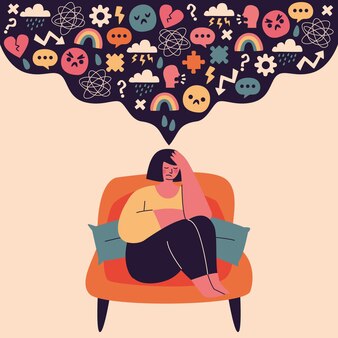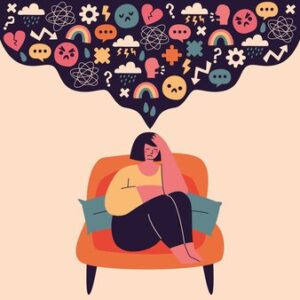
by Beth Ayers, Family Peer Support Lead
October 3, 2023
I am a mom of two, now adult, children with behavioral health challenges and I work as a Family Peer Supporter helping other parents currently raising children with special healthcare needs including behavioral health. As a Family Peer Supporter, I get to walk beside families and help lift their burden by listening and connecting through a shared lived experience. Parenting is stressful in and of itself. It’s a full-time job with no training manual. Parents don’t clock in and clock out. They don’t get to call in sick. And a literal life depends on how well you do! Like most moms, I envisioned the future for my children including friends, activities, school, summer camp, growing up, high school dances, graduation, college, marriage, children of their own, and so on. I also envisioned my relationship with my kids to be loving and close. Of course, I was aware all this included the terrible 2’s and rough teenage years. But never did I imagine mental health diagnoses, psychiatric hospital stays, broken relationships, not finishing high school, or residential programs for my children. I suppose nobody does. We all want the best for our children and it’s hard to watch our kids struggling and hurting.
 According to research, 31% of parents of children with special healthcare needs experience clinical depression. That’s compared to only 7% of parents of children without these extra needs1. Special healthcare needs can include physical, developmental, or intellectual disabilities, mental health or substance use disorders, or any complex medical care need. The two most likely contributors to the increased risk for depression are chronic caregiver stress and financial stress. From my own experience, it encompasses much more.
According to research, 31% of parents of children with special healthcare needs experience clinical depression. That’s compared to only 7% of parents of children without these extra needs1. Special healthcare needs can include physical, developmental, or intellectual disabilities, mental health or substance use disorders, or any complex medical care need. The two most likely contributors to the increased risk for depression are chronic caregiver stress and financial stress. From my own experience, it encompasses much more.
For me, depression came as part of the grieving process as I let go of my hopes and dreams for my children. I also experienced depression from trying to do everything perfectly and worrying the worst would happen if I didn’t. Depression was the result of long days of constant parenting battles and treatment plans and emotional escalations. It was from all of the feelings I felt (sadness, desperation, anger, love, loneliness, fear, joy, hope, heartache, compassion, resentment, self-pity) and not knowing what to do with most of them. It was the stress of constant appointments and therapies on top of the other daily responsibilities of school, work, chores, dinner, homework, pets, bills, etc. that I didn’t have the physical, mental, or emotional energy for. Depression was the result of the judgement and misunderstanding I felt from others and the blame and guilt I felt from myself. Depression for me was feeling overwhelmed, irritable, and hopeless. Depression made me want to give up and give in. Some days I just couldn’t do it anymore.
And then I was told the answer was self-care. I needed to manage my stress better. What?! How?! When?! With what “extra” time and money and energy?! I was so busy and focused on caring for my child and their needs and wellness that I overlooked my own. My child’s health and safety were my top concerns. I just wanted everyone to be okay and life to go as I had planned. But we’ve all heard the saying, “You can’t pour from an empty cup.” The depression I struggle with is part genetic, part situational. Over the years, I have learned the signs of my depression and how to remove stress from my life. I’ve learned how to work through feelings and accept life’s messiness better. The Family Peer Supporters at MPN are taking a Caregiver Wellness training. I have learned some great strategies and been reminded of things that have worked for me in the past. Here are a few:
- Deciding, on purpose, how I will react to stress. I can view it as something to be avoided at all costs and react with survival methods such as fight or flight. Or I can view stress as helpful and see it as a challenge. Fight or flight responses deplete my energy, whereas a challenge response energizes me to rise to the occasion.
- Realizing I stress about things because I care about them. I love my children. I can focus on the gratitude I feel for having someone so special in my life.
- Changing my view of stress. Whether I think stress is harmful or helpful, I’m right. I can let stress drive me towards people and connection or I can let it drive me away towards isolation. I can learn and grow from stress and find new tools to help me handle stress better. I can find meaning in my circumstances such as helping other families as a Family Peer Supporter.
- Adjusting my expectations to meet the reality of my situation. Unrealistic expectations add stress to my life and increase my depression. My child may not get through the school day with a regular class schedule like other kids. But we can shorten the day or adjust the number of times they change classes, relieving unneeded pressure and helping them succeed and thrive. Which in turn lessens my stress.
- Protecting against “Decision Paralysis.” When raising a child with a special healthcare need, not making a decision is usually not an option. I want to see into the future and make the “right” decision. I have found that there usually isn’t a “right” and “wrong” decision and it’s okay to make one based on the information I have right now. There will be more decisions to come. And when I realize a decision I made wasn’t the best, I can make another decision based on the new information I have.
- Accepting I don’t have the luxury to say yes to everything. I might want to be the class mom, Sunday school teacher, and the mom that makes every birthday treat from scratch. But the reality is my child’s needs are higher than most. My time and energy are more limited. Trying to do more than I can adds unnecessary stress to my life.
And last but not least: Being gentle with myself. Life is hard and messy and beautiful and wonderful all at the same time. I am going to mess up. I will make mistakes. I can learn from my mistakes. My patience will run out. I will have to apologize. I am human. I can take life one day at a time. I can enjoy the little wins, the moments of peace, the times I get to hug my children or kiss them goodnight. I love my children and I love myself. I am doing the best I can. You are doing the best you can. We are enough.

